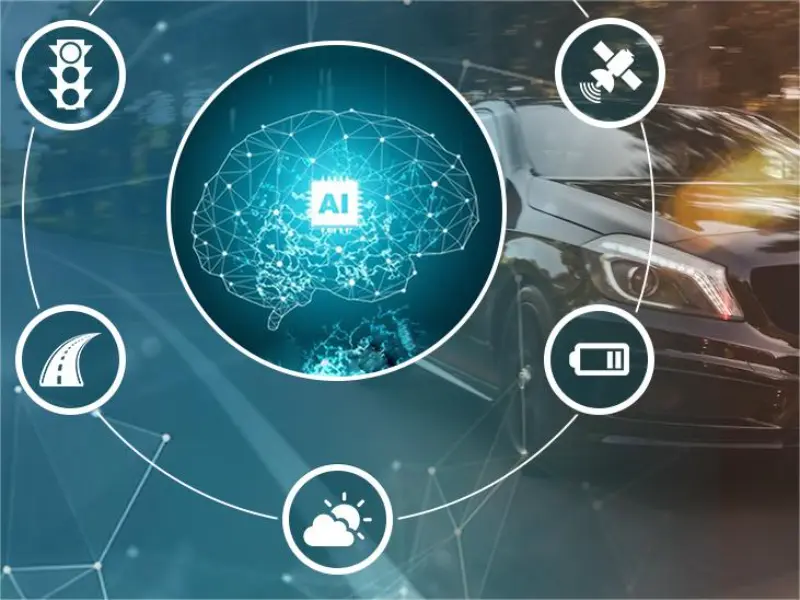- Generative AI has comprehensively surpassed the data processing and analysis capabilities of traditional software, and by leveraging AI technologies effectively, automotive companies can drive innovation, improve efficiency, and deliver value to customers.
- Generative AI has the potential to revolutionise various aspects of the automotive industry, from design and manufacturing to customer experience and autonomous driving.
Companies such as Anthropic, Microsoft, Google, and Baidu, as well as many smaller companies, have developed generative AI models that are widely used in various industries, including software development, healthcare, finance, entertainment, and more.
While generative AI benefits all walks of life, it also provides help and services for automobile companies, playing a crucial role in the entire process of automobile production and manufacturing, injecting the power of technology into it.
Landscape on automotive companies
Automotive companies are businesses that design, manufacture, distribute, and sell vehicles, including cars, trucks, motorcycles, and other types of vehicles. Automotive companies are a crucial part of the global economy, specialising in the design, development, manufacturing, and marketing of vehicles. The automotive industry is highly competitive, with companies constantly innovating to meet consumer demands, technological advancements, safety standards, and environmental regulations.
Also read: What is automotive technology?
Some well-known automotive companies include: General Motors (GM), Ford Motor Company, Toyota Motor Corporation, Volkswagen Group, Honda Motor Co., Ltd., BMW Group, Nissan Motor Corporation, Hyundai Motor Group and Mercedes-Benz (Daimler AG).
These companies often have multiple brands under their umbrella, each catering to different market segments and demographics. For example, General Motors owns brands like Chevrolet, GMC, Cadillac, and Buick, while Volkswagen Group owns Volkswagen, Audi, Porsche, and several others.
Application of Gen-AI in automotive industry
Generative AI is an artificial intelligence capable of using complex algorithms, models, and rules, learning from large-scale data sets, and then generating new data with similar features, comprehensively surpassing the data processing and analysis capabilities of traditional software.
Also read: Valeo embraces Google Cloud and AI to drive automotive innovation
Design and prototyping
Generative AI can assist in designing and prototyping vehicles, components, and parts. By analysing vast amounts of data and specifications, AI algorithms can generate design options, optimise parameters for performance and efficiency, and accelerate the prototyping process.
Simulation and testing
AI-driven simulations enable automotive companies to test and validate vehicle performance, safety features, and aerodynamics virtually. This reduces the need for physical prototypes, speeds up testing cycles, and enhances the overall product development process.
Supply chain optimisation
Generative AI can optimise supply chain operations by predicting demand, optimising inventory levels, improving logistics planning, and identifying cost-saving opportunities. This leads to more efficient production processes and reduced operational costs.
Manufacturing optimisation
AI-powered robotics and automation systems can enhance manufacturing processes in automotive plants. Generative AI algorithms can optimise production lines, improve quality control, and reduce defects by analysing real-time data and making adjustments in real-time.
Autonomous driving
AI plays a critical role in the development of autonomous driving technologies. Generative AI algorithms are used for perception, decision-making, and planning in self-driving vehicles. They enable vehicles to perceive their surroundings, make real-time decisions, and navigate complex environments safely.
Predictive maintenance
Generative AI can analyse sensor data from vehicles to predict maintenance needs and identify potential issues before they occur. This proactive approach to maintenance improves vehicle reliability, reduces downtime, and enhances overall customer satisfaction.
Personalised experiences
AI-powered personalisation enables automotive companies to offer personalised experiences to customers. This includes personalised recommendations for vehicle features, customisation options, and post-purchase services based on individual preferences and behaviour.
Customer engagement
AI-driven chatbots and virtual assistants enhance customer engagement by providing real-time support, answering queries, and assisting with service bookings. This improves customer satisfaction and streamlines communication between customers and automotive companies.

